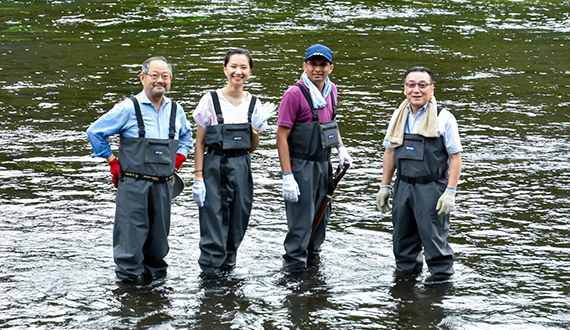
Alumni of the Rotary Yoneyama Memorial Foundation work with Rotary members on a clean up project.
By Masa Kato
As a regional communications specialist for Rotary International, I get excited when I hear stories about students who have had their lives changed by Rotary scholarships. Lasitha Eriyawa, a Sri Lankan, came to Japan in 2001 to pursue his college education. During his senior year, he received a scholarship from the Rotary Yoneyama Memorial Foundation, a program administered by an independent foundation named after Umekichi Yoneyama, the Father of Rotary in Japan.
Through this program, Rotarians in Japan have supported more than 20,000 international students in the past half-century. More than half of them are from China, South Korea, and Taiwan. But the foundation has accepted students from around the world. One thing that is unique is that a Rotary club in Japan is assigned as the “sewa club” (host club) for each scholar and that club members provide comprehensive support so that the students can focus on their studies.
Today, Yoneyama alumni are taking leadership roles in various fields. Many of them participating in Rotary service. Lasitha is one of them. While working as a team leader in the software engineering division of a semiconductor manufacturing company in Japan, he started a project to support a government hospital in a remote area of Sri Lanka. To collect the funds, he served tea made from top-grade leafs rarely available anywhere but in Sri Lanka and asked for donations at Rotary meetings in Japan.
Lasitha told me there are several things he thinks Rotarians should know about the impact of Yoneyama alumni.
- Building a bridge between countries. In international projects, communication between two countries can be strenuous. Arranging a needs assessment, providing stewardship, and reporting on a project can burn the contact people out. Yoneyama alumni like Lasitha can provide a bridge between Japan and their native countries. In Lasitha’s hospital project, many villagers had never seen foreigners and the hospital had no phone lines. Yet the Yoneyama alumni reduced the need for lengthy communications.
- Providing cultural sensitivity: In service projects, it is also important to consider the feelings of local residents. Just checking through business leaders and local government may not be enough to identify small but important arrangements for the project. Alumni, who are often familiar with local customs, can provide meaningful insights. In the project Lasitha joined, in addition to direct support, sutras (readings of Buddhist scripture) by a local monk and supplies to the temple were arranged. Gaining the understanding of religious leaders helped the project build trust and cooperation among the villagers.
- Creating prospective Rotary members: Lasitha, currently a member of the Rotary Club of Kofu South, was not interested in joining Rotary at first. As a Yoneyama scholar, he said he felt, “I would join someday if allowed the opportunity”. But the club never forgot about him. Yoneyama scholars are not only fluent in Japanese, but also have excellent academic backgrounds in their home country as well. Many of the Yoneyama alumni who have returned to their homeland work at top levels in academics, business, or politics. Yoneyama Alumni Associations have been established in many parts of the world and often work with Rotary clubs on service projects.
The Rotary Yoneyama Memorial Foundation, as well as the legacy that Rotarians in Japan have built with respect to the Father of Rotary in Japan, are gems that are sometimes overlooked. I encourage you to share this story with anyone who is considering working with Japanese clubs or who is interested in pursuing higher education in Japan. You can read the full story about Lasitha and the impact of Yoneyama on the Japanese blog.(In Japanese)
Learn more about the Rotary Yoneyama Memorial Foundation and about Umekichi Yoneyama
https://blog.rotary.org/2019/11/22/scholarship-program-in-japan-pays-dividends/
